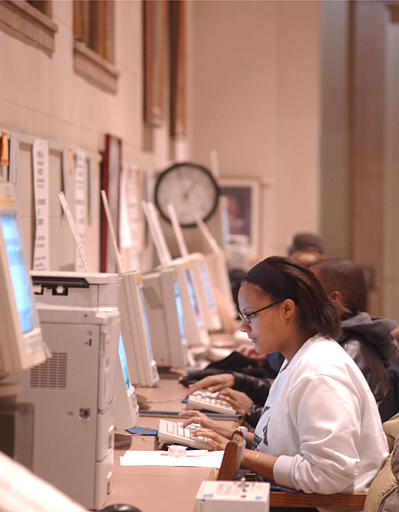In United States v. American Library Association, 539 U.S. 194 (2003), the Supreme Court upheld the constitutionality of the federal Children’s Internet Protection Act (CIPA), finding that the act does not violate a library patron’s First Amendment rights.
CIPA requires libraries to install filtering technology on computers
CIPA requires libraries, as a condition for receiving federal funding, to install filtering technology on all their Internet-enabled computers.
The filters must prevent access to visual depictions of obscenity and child pornography; for computers that are accessible to minors, visual depictions that are “harmful to minors” also must be filtered. The law contained a “disabling provision” that permitted libraries to disable the filters on the request of an adult who sought such disabling “for bona fide research or other lawful purpose.”
Library association, ACLU challenge CIPA as First Amendment restriction
The American Library Association, the American Civil Liberties Union (ACLU), and a variety of other parties challenged the law on its face, making two principal arguments:
- CIPA effectively forced public libraries to violate the First Amendment rights of their patrons and web publishers; and
- CIPA violated the “unconstitutional conditions” doctrine, the principle that “the government may not deny a benefit to a person on the basis that infringes his constitutionally protected freedom of speech, even if he has no entitlement to that benefit.”
A three-judge panel ruled unanimously in favor of the petitioners, but in a 6-3 vote the Supreme Court rejected the facial challenge.
Court upheld law, compared Internet filtering to library book selection
Chief Justice William H. Rehnquist’s opinion for a plurality of four justices analogized Internet filtering to book selection decisions. Because decisions as to which books to have in a library’s collection were part of the library’s traditional “mission of facilitating learning and cultural enrichment,” such decisions were within the discretion of the library.
The plurality also rejected the unconstitutional conditions doctrine argument, concluding that because libraries could simply refuse the federal funds, their free speech rights were not being infringed.
Dissenters upheld law because of provision allowing unfiltered adult access when requested
In two separate concurring opinions, Justices Anthony M. Kennedy and Stephen G. Breyer reasoned that the statute should be upheld primarily because of the disabling provision.
Kennedy concluded that if the disabling provision were interpreted to mean that “a librarian will unblock filtered material or disable the Internet software filter without significant delay” for any adult who so requests, then the facial challenge to the statute should fail. Justice Breyer concluded that the disabling provision rendered the statute no “more onerous than traditional library practices associated with segregating library materials in, say, closed stacks, or with inter-library lending practices.”
Both Justices Kennedy and Breyer invited as-applied challenges to the statute if a particular library failed to disable the filters expeditiously upon an adult’s request.
Souter compared law to ‘cutting pages out of an encyclopedia’
Justice John Paul Stevens dissented, writing that the CIPA “operates as a blunt nationwide restraint on adult access to an enormous amount of valuable information.” He also concluded that the statute violated the “unconstitutional conditions” doctrine because it “penaliz[ed]” libraries that refused to use filters.
In another dissent, Justice David H. Souter compared Internet filters to “cutting pages out of an encyclopedia” and concluded that such content-based censorship violated the First Amendment.
This article was originally published in 2009. Anuj C. Desai is the William Voss-Bascom Professor of Law at the University of Wisconsin, where he teaches in both the Law School and the iSchool. Among his classes are those in First Amendment, Intellectual Freedom, and Cyberlaw. He has published numerous articles on topics related to the First Amendment, including in the Stanford Law Review and Federal Communications Law Journal. Prior to entering academia, Professor Desai practiced law with the Seattle, Washington firm of Davis Wright Tremaine, where his practice included a variety of First Amendment-related matters.

